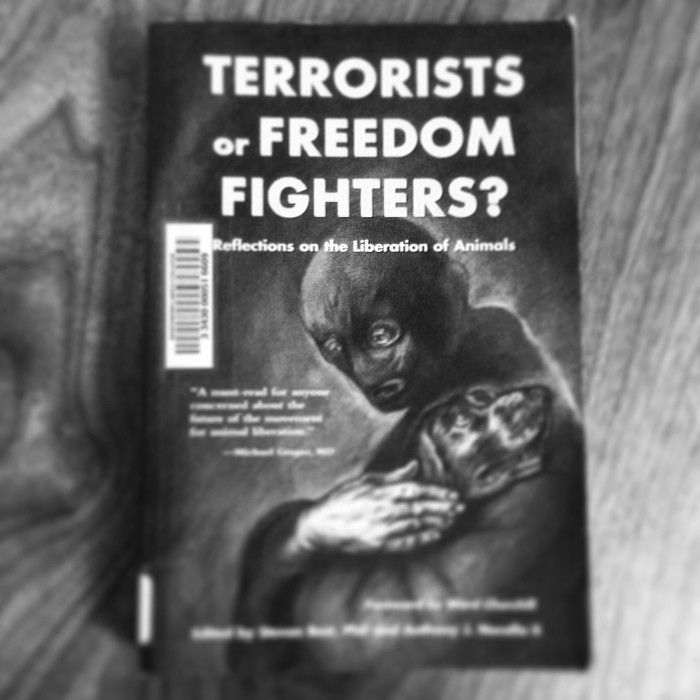
Starting 2019 off with a call to compassionate arms, the global struggle to control climate change and reduce the needless suffering of animals is on the rise. And this is what Terrorists or Freedom Fighters? (2004) is about – the push for animal rights and why the Animal Liberation Front (ALF) takes the approach it does.
Many in the mass media brand the efforts of the ALF as acts of terrorism. But you look at statistics from circa 2013 and we’re talking about the annual slaughter of (in the US alone):
- 8.5 billion chickens.
- 32.5 million cattle.
- 12 million pigs.
Is that acceptable? It’s all in the name of humans enjoying a bite to eat they can’t remember within 48 hours. Well, with the likes of veganism making more headlines, there’s a global push to stop the mindless carnage.
Terrorists or Freedom Fighters?
Although we’ve not read all of the essays in this work, contributors include PhD academics, ecofeminists, and even anonymous individuals. We have the likes of Robin Webb, Rod Coronado, Ingrid Newkirk, Paul Watson, Karen Davis, and pattrice jones (who styles her name like that – that’s not a typo).
The anthology presents writings on the ethics, politics, and tactics of the ALF. Steven Best and Anthony J. Nocella edited the various works, all of which present a far-reaching debate beyond a bunch of vegans telling you to not eat meat (which, as a lot of people make clear in comments sections online, they find irritating).
But the meat consumption factor is a major international issue that’s gaining more traction in the media. The global mass farming industry is causing an almost immeasurable amount of damage to the planet. Right at the end of 2018, we had this call to arms from English broadsheet The Guardian.
Why eating less meat is the best thing you can do for the planet in 2019 https://t.co/d3HMcx1xSu
— The Guardian (@guardian) December 30, 2018
Here’s an extract from the piece:
"Recycling or taking the bus rather than driving to work has its place, but scientists are increasingly pointing to a deeper lifestyle change that would be the single biggest way to help the planet: eating far less meat. A swathe of research released over the past year has laid bare the hefty impact that eating meat, especially beef and pork, has upon the environment by fueling climate change and polluting landscapes and waterways."
The Guardian’s article highlights the need to cut down on meat consumption. Strangely, given the progressive approach of the publication, it fails to mention the scale of the suffering the industry lands on tens of millions of animals.
And, on a moral level, it’s a broken outlook. It’s part of the distorted scenario where people can maintain pets they love and would never dare harm, but have no problem eating meat from a cow shot with a pressurised air gun.
Anyone who dares stand against the mass slaughter is branded a far-left irritation – an irrelevancy that needs stamping out. This backlash has fuelled the likes of Peter Singer, a moral philosopher, to champion altruism.
The Guardian article ignores the full-scale of the situation, whilst attempting to come across as ahead of the moralistic curve.
And that highlights one of the main problems with eating meat. It’s far too easy to walk into a supermarket and see a red disc in a pre-packaged bit of plastic on a shelf and not think much of it. But the background behind each piece of meat is one of suffering and violence.
But Terrorists or Freedom Fighters? isn’t here to lecture you about any of that. The essays explain the ALF movement – such as its beginning, links to feminism, and how the mass media (particularly in America and the UK) portray its “far-left” agenda.
It’s an intriguing mixture of academic and activist debate describing how the ALF fits into the animal rights movement. There’s advocacy such as civil disobedience, sabotage, and considerations on the nature of democracy and freedom.
The goal of the work was (and still is) to challenge the norms that exist in the world today, clearly indicating why we shouldn’t be shackled by anachronistic practices that cause such grand scale torment.
It achieves that in intelligent polemical fashion and we urge you to read it to up your knowledge on why animal rights is so important for the future of everything.
But for the casual reader, the philosophical weight of the work may be too heavy. As such, they can approach the topic from one of the various documentaries we’ve highlighted further below.
Verily Vegan
“If someone’s eating a lamb chop, in your mind that’s the equivalent of them eating a child, a baby?”
That was the question put to vegan activist, Cath Kendall, who says she’d find “both equally as offensive.”
Watch The Truth About Vegans, tonight at 10 on @Channel4 #Dispatches pic.twitter.com/5Wk6SrXh2H
— Channel 4 Dispatches (@C4Dispatches) January 2, 2019
Just the other day, here in England, there was a much-anticipated documentary on Channel 4: The Truth About Vegans. You can see a snippet above of the opposing non-vegan and vegan viewpoints. Because tradition is important and should never change.
Veganism is pretty trendy right now. British bakery company Greggs went and let loose a vegan sausage roll this week. Former tabloid editor, Piers Morgan, wasn’t happy about that at all, rolling out some banal right-wing invective to mark the occasion.
Nobody was waiting for a vegan bloody sausage, you PC-ravaged clowns. https://t.co/QEiqG9qx2G
— Piers Morgan (@piersmorgan) January 2, 2019
To which a longstanding BBC satire news show, and general hater of Piers Morgan, was happy to point out a bit of hypocrisy.
After a vegan sausage roll sends Piers Morgan into a meltdown, experts say it’s a good job he isn’t one of those easily-offended snowflakes he’s always talking about.
— Have I Got News For You (@haveigotnews) January 3, 2019
Whilst many remain belligerent and confused about animal rights/veganism, there’s no denying the whole movement is gaining some serious traction. But this continues to create a major social divide between longstanding meat eaters and those expecting a change in ways.
Ultimately, it’s your decision. But in troubling times, with humanity’s future on the planet facing serious jeopardy, morally, and on a preservation front, there’s a total requirement for all of us to do our bit.
Changing social attitudes is one step, but the world’s governments need to do their part. And, in our opinion, there has to be a shift towards stamping out social inequality to support the animal rights movement.
Significantly decreasing inequality (in the UK, for instance, 14+ million live in poverty after a decade of austerity) would facilitate the shift towards a morally-minded future. In the meantime, lecturing destitute people on what to eat isn’t going to achieve much. Even if they want to, the millions of Brits living off food banks don’t get the vegan option.
But organising change and getting everyone to agree to be less brutal (which includes obstinate big businesses) is one Hell of a challenge. But it has to happen.
Supporting Documentaries
A whole bunch of documentaries are appearing to support the cause. 2018’s Dominion, something of a passion project for actor Joaquin Phoenix, met with rave reviews.
As did the Leonardo DiCaprio backed Cowspiracy. Such a goddamn terrible title for a film, we think, but highly affecting as a media text all the same. It caused a big reaction on social media after its appearance on Netflix in 2016, with many acknowledging a film had never profoundly affected them as much.
Further back in time, efforts such as The Cove (2009) and Blackfish (2013) overtly display how an activist documentary can push through social and governmental change.
And with Dominion and co. receiving voluble support across the world, we may well see a seismic shift in public attitudes towards animal rights over the next decade. There’s a lot riding on that success.
